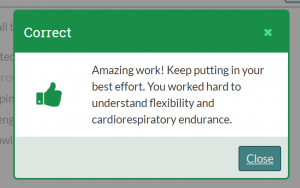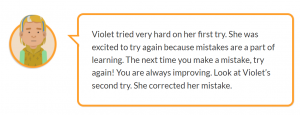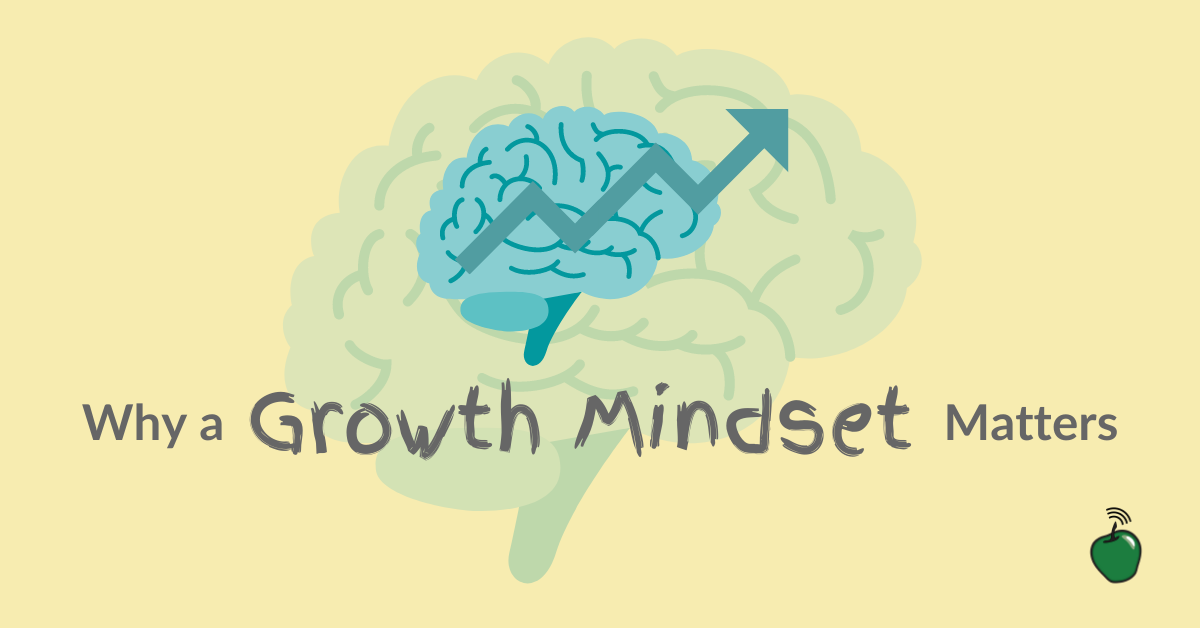Few words are as discouraging to hear from a student as “I can’t do this” or “I’m not good at that.” If students believe that they don’t have the ability to grasp a new concept or acquire a new skill, they may dismiss a demanding task rather than persist in completing it. The ways that students perceive their abilities can influence their success. It is critical that students have confidence in themselves and the strategies they use to overcome obstacles. Virtual Elementary School advocates for students to develop a growth mindset and a commitment to reaching their full potential.
 A mindset is a set of beliefs that a person has about themselves and the world around them. There are two basic mindsets: growth and fixed. Those with a fixed mindset believe that a person’s abilities, skills, and intelligence are innate traits that cannot be changed. On the other hand, those with a growth mindset believe that anyone can get better at something by dedicating effort and persevering. A person with a fixed mindset may say “I’m not good at it, and I can’t change it,” while someone with a growth mindset would say “I can learn anything.” The benefits of a growth mindset have been studied extensively, particularly by psychologist Carol Dweck. Research has shown that these mindsets have implications for a student’s perception of their learning potential.
A mindset is a set of beliefs that a person has about themselves and the world around them. There are two basic mindsets: growth and fixed. Those with a fixed mindset believe that a person’s abilities, skills, and intelligence are innate traits that cannot be changed. On the other hand, those with a growth mindset believe that anyone can get better at something by dedicating effort and persevering. A person with a fixed mindset may say “I’m not good at it, and I can’t change it,” while someone with a growth mindset would say “I can learn anything.” The benefits of a growth mindset have been studied extensively, particularly by psychologist Carol Dweck. Research has shown that these mindsets have implications for a student’s perception of their learning potential.
A growth mindset matters because it empowers students to see themselves as capable and in control of their learning. A student with a fixed mindset may be unmotivated because they believe they don’t have an inherent trait that would allow them to be successful. A student may also fear failure and be concerned about how others perceive them if they make a mistake. However, a student with a growth mindset is open to embracing challenges to learn and grow. This includes seeing mistakes as opportunities to improve and part of the learning process. This allows students to be versatile and have the confidence to step outside of their comfort zone.
 VES courses are designed with growth mindset at the forefront. Using characters and situations that are relatable to students, the courses normalize mistakes as a part of the learning process. In showing how to implement problem-solving skills applicable to real-life situations, students can internalize these processes to overcome challenges. Students develop a toolbox of skills to approach learning, including asking for help and trying new strategies to achieve a goal. Students are also prompted to explore various interests and pursue passions that they may not have otherwise.
VES courses are designed with growth mindset at the forefront. Using characters and situations that are relatable to students, the courses normalize mistakes as a part of the learning process. In showing how to implement problem-solving skills applicable to real-life situations, students can internalize these processes to overcome challenges. Students develop a toolbox of skills to approach learning, including asking for help and trying new strategies to achieve a goal. Students are also prompted to explore various interests and pursue passions that they may not have otherwise.
A growth mindset is also reinforced through feedback. It’s important that feedback recognizes effort, and especially progress, that is made in a student’s goals. Growth mindset feedback reinforces that just because you try something and aren’t successful the first time doesn’t mean that is the only opportunity to be successful. Rather than focusing on the outcome, such as whether something is simply correct or incorrect, the student’s effort and learning process are recognized. With a growth mindset, students are more likely to openly accept and apply feedback.
You can support your learner in developing a growth mindset by using language that focuses on their hard work, problem solving, or resilience in the face of a challenge. As learners hear this type of reinforcement, it solidifies their confidence in their capabilities. This includes thinking of learning as an ongoing process and that although they may not have reached their goals yet, continuing to demonstrate persistence will pay off. Acknowledge your student for learning from setbacks rather than avoiding them. While it may seem innocent to praise talent or intelligence, this type of feedback can reinforce a fixed mindset.
You can help cultivate a growth mindset through a thoughtful approach to shaping how students perceive their ability to learn. The shift in perspective from fixed to growth mindset can be the difference between a student becoming frustrated when facing a demanding task or a student demonstrating resilience and tackling the task at hand. A growth mindset not only serves students in their education but will continue into every facet of their lives now and into the future. This will help your learner see themselves as capable as you see them and inspire them to approach obstacles with the mindset that they can do anything.

